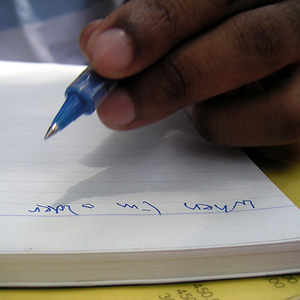I read an article in The Guardian on the art of slow reading, and how skim reading on the Internet may have made us more stupid. But I think the same could be said for writing.

Of course I’m now sat at my computer, typing away frantically. The words appear on screen almost faster than they arrive in my head – hence the need for continuous backspacing. I hit the backspace key more frequently than I press the space bar. I kinda know what I’m saying, but I haven’t planned it in too much detail and I don’t yet know how it’s going to end. But none of that matters; with a little deleting, cutting, pasting and inserting I’ll have it done in no time. But how much skill and thought will I have used, compared to if I had written it by hand?
Writing anything by hand, but especially something of decent length such as an essay or article, takes a great deal of thought. Unless you want a page covered in Tippex (do you remember that stuff – does it still exist?!) then each word has to be carefully planned beforehand. The whole structure of the piece needs consideration before you even begin, and each paragraph, sentence and word must be considered. There’s little room for mistakes, and there’s no chance of your pen overtaking your brain.
I’m sure anyone born in the same decade as me will remember school and college days of writing everything by hand. I wonder if we learnt more as a result. They say we take in more of what we write than what we hear or even read, and I’m pretty sure we learn more by writing about something than by typing about it.
I’m certain that physical writing allows a person to really know and feel what they are saying, in a way that just isn’t necessary when typing. Typing is lazy writing, and can almost be secondary to other thoughts going on in the head – my fingers can keep moving across the keyboard while I also decide what to cook for dinner. I’m not capable of such multi-tasking when writing by hand, when my focus must remain purely on the words.
I also think we give up far more easily when typing. I’ve got so many started and casually abandoned articles on my computer, because giving up on half an hour’s work doesn’t seem too much of a big deal. But if you’ve spent four hours lovingly applying ink to paper, I think you’re less likely to give up on it and throw it away, never to be touched again.
My hands have been motionless for several seconds now, lurking mid-air over the keyboard while I ponder with satisfaction the full page of words in front of me. Such a pose, no doubt with a somewhat vacant expression on my face, tells me I’ve probably run out of words and should bring this thing to a close now.
So if you’ve quickly skim read parts of this frantically typed article, do let me know if you feel any more stupid than you would had you slowly read a handwritten version of the same thing.
[Jules]
Photo credit: indi .ca
Jules is an executive PA and also runs the largest eraser emporium in the world (AFAIK) and you can find out more at originalerasers.co.uk
Jules manages FirstSigns with me, and is a keen writer with an eye for detail like an electron microscope.
If you’d like to share or tweet this article, the short URL is: http://kilobox.net/1830







Thanks Jules. I also find I’m able to better remember what I write than what I type. And I feel as if my writing style changes too: I’m more whimsical in ink, and maybe even more so in pencil!
Hear, hear.
If I was you, I’d contact Google with the idea of converting the whole web into handwriting.
That’ll keep them busy.
;)